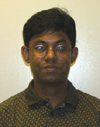New reseacher a ‘hardcore immunologist’
by Michael BakerPublic Relations
The Department of Microbiology and Immunology welcomed a new member in early June. Azizul Haque, Ph.D., accepted a position as assistant professor on June 1, bringing with him an impressive record of research.
 Dr.
Azizul Haque
Dr.
Azizul Haque
Haque comes to MUSC from Indiana University School of Medicine and the IU Cancer Center, where he developed a passion for immunology.
“I’d say I’m a hardcore immunologist,” he said. “The immunologists at MUSC are excellent, but there aren’t very many. I’d like to build a stronger program here.”
True to his assertion, Haque will focus mainly on cancer immunology. Concentrating specifically on melanoma and lymphoma, he’ll build upon the intriguing research he conducted at Indiana.
While studying melanoma in the IU Cancer Center, he discovered a key difference between typical, healthy cells and melanoma cells.
“Normal cells contain a certain enzyme that melanoma cells don’t have,” he explained. “Without the enzyme, melanoma cells escape immune recognition. The immune system’s T-cells don’t recognize the cancerous cells as harmful and don’t attack them.”
Haque wants to find a way to assist the immune system’s recognition process, allowing the T-cells to identify melanoma cells.
“Using animal models, I’ll replace the missing enzyme in melanoma cells to see if the T-cells will recognize and fight the cancer,” he said. If his hypothesis proves true, it could provide a tremendous boost in the search for a cure for melanoma.
Haque also wants to increase lymphoma research at MUSC. “I’d like to form a strong leukemia/lymphoma research group,” he said, adding that he’d spoken with colleagues Julio Barredo, M.D., Andrew Kraft, M.D., and Daniel Fernandes, Ph.D., about such a project.
“To get any external funding,” he said, “it’s necessary to work as a group, rather than as individuals.”
Another aspect of Haque’s work involves transplant immunology and the prevention of graft rejection. Graft rejection occurs when the immune system recognizes a foreign presence in the body—in this case, the transplanted tissue. The immune system sends cells to defend the body against the new presence, and the transplanted tissue fails.
“In a lung transplantation model, the T-cells that recognize the new tissue are triggered by a collagen molecule,” he explained, “but the entire molecule isn’t to blame. I hope to identify which segment of the collagen molecule is responsible for triggering the T-cells and causing graft rejection.”
After identifying the molecular portion responsible for graft rejection, Haque would seek a way to circumvent the process.
The idea of identifying specific parts of molecules carries over into Haque’s third area of research. As a graduate student, he spent five years in Japan studying autoimmune diseases using animal models. Now he wants to make disease suppression more efficient. Rather than using an entire molecule to treat afflictions such as arthritis, he hopes to isolate and utilize only the effective part of the molecule.
“It’s like comparing the sizes of past and current technology,” he said. “In the past, we used huge computers to do the same job that smaller computers perform today. Similarly, I want to test whether a specific, smaller portion of the molecule can attack arthritically-inflamed cells.”
Suppression remains his primary goal. “Prevention is ideal, but if you can’t suppress the diseases, you can’t prevent them,” he said.
The freedom to pursue his research interests was a major factor in Haque’s decision to accept the position at MUSC. During his initial visits to the university, he met with James Norris, Ph.D., and Yusuf Hannun, M.D., the chairmen of the departments of Microbiology and Immunology and of Biochemistry and Molecular Biology, respectively.
“Jim has been very helpful,” Haque said, “and Yusuf has been a mentor and an advisor to me. They’ve both been very positive.”
With their support and the ability to remain autonomous yet team-oriented, Haque hopes to build upon his previous research while making new discoveries in immunology at MUSC.
Friday, Aug. 13, 2004
Catalyst Online is published weekly, updated
as needed and improved from time to time by the MUSC Office of Public Relations
for the faculty, employees and students of the Medical University of South
Carolina. Catalyst Online editor, Kim Draughn, can be reached at 792-4107
or by email, catalyst@musc.edu. Editorial copy can be submitted to Catalyst
Online and to The Catalyst in print by fax, 792-6723, or by email to petersnd@musc.edu
or catalyst@musc.edu. To place an ad in The Catalyst hardcopy, call Community
Press at 849-1778.